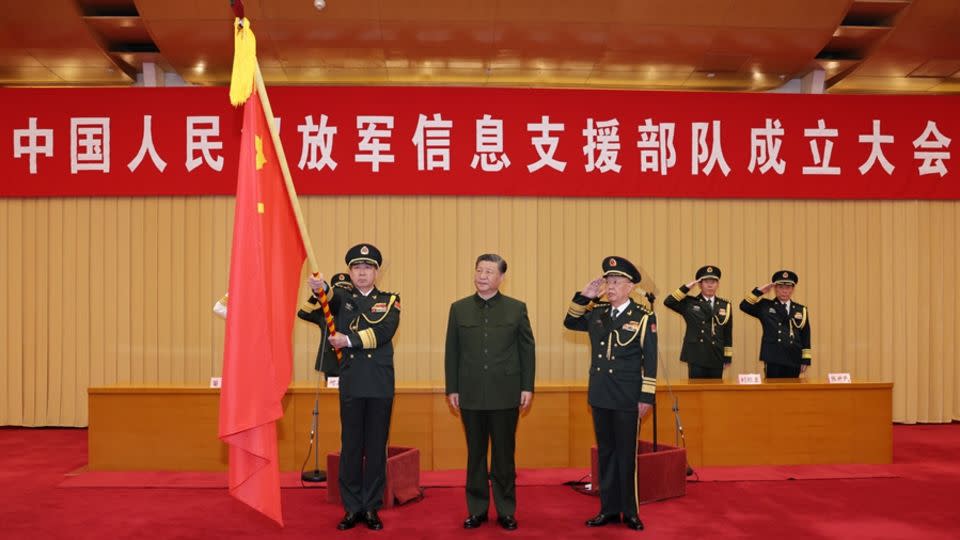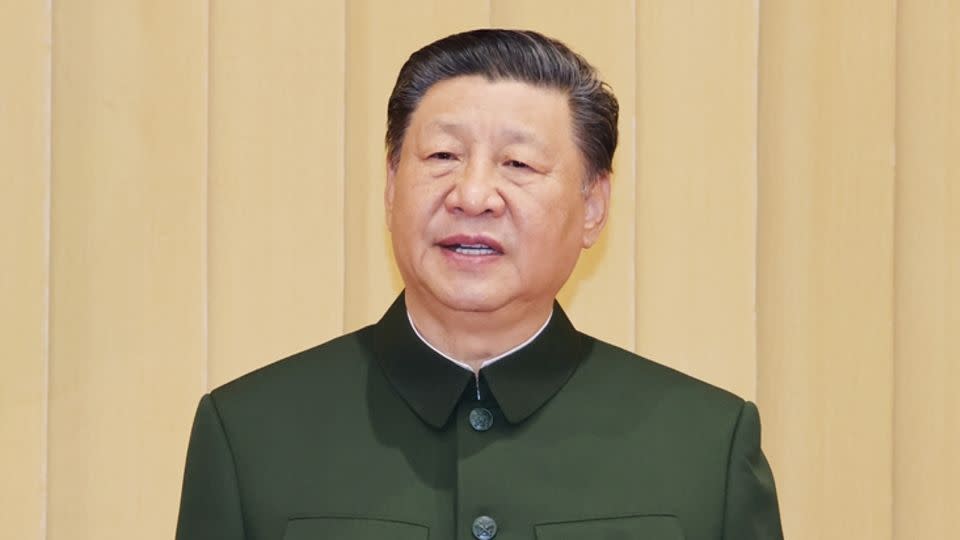Xi shakes up China’s military in rethink of how to ‘fight and win’ future wars
- Oops!Something went wrong.Please try again later.
Editor’s Note: Sign up for CNN’s Meanwhile in China newsletter which explores what you need to know about the country’s rise and how it impacts the world.
China has rolled out the largest restructuring of its military in almost a decade, focusing on technology-driven strategic forces equipped for modern warfare, as Beijing vies with Washington for military primacy in a region rife with geopolitical tensions.
In a surprise move last week, Chinese leader Xi Jinping scrapped the Strategic Support Force (SSF), a military branch he created in 2015 to integrate the People’s Liberation Army’s space, cyber, electronic and psychological warfare capabilities as part of a sweeping overhaul of the armed forces.
In its place, Xi inaugurated the Information Support Force, which he said was “a brand-new strategic arm of the PLA and a key underpinning of coordinated development and application of the network information system.”
The new force would play an important role in helping the Chinese military “fight and win in modern warfare,” he said at a ceremony last Friday.
At a news conference on the same day, a spokesperson for China’s Defense Ministry appeared to suggest the SSF was effectively broken into three units – the Information Support Force, the Aerospace Force and the Cyberspace Force – which will answer directly to the Central Military Commission, the body at the top of the military chain of command headed by Xi.
Under the new structure, the PLA now consists of four services – the army, navy, air force and the rocket force – plus four arms: the three units spun off from the SSF and the Joint Logistic Support Force, according to ministry spokesperson Wu Qian.

Experts on the Chinese military say the reorganization enhances Xi’s direct control over the PLA’s strategic capabilities and underscores China’s ambitions in better mastering AI and other new technologies to prepare for what it calls the “intelligentized warfare” of the future.
The restructuring follows Xi’s sweeping corruption purge of the PLA last year, which ensnared powerful generals and shook up the rocket force, an elite branch overseeing China’s fast-expanding arsenal of nuclear and ballistic missiles.
The Information Support Force will be led by top generals from the now-defunct SSF.
SSF deputy commander Bi Yi was appointed commander of the new unit, while Li Wei, the SSF’s political commissar, will take the same role in the Information Support Force, according to state-run news agency Xinhua.
There was no mention of any new appointment for SSF commander Ju Qiansheng, who last year spurred speculation when he disappeared from public view amid a flurry of military purges before eventually resurfacing at a conference in late January.
‘Better visibility’
Longtime PLA watchers say the latest reorganization is unlikely the result of the recent corruption purges, but rather a reflection that the SSF wasn’t an ideal organizational format for the Chinese military.
“It shows that the SSF was not a satisfactory arrangement. It reduced Xi’s visibility of important functions and did not really improve coordination between space, cyber, and network defense forces,” said Joel Wuthnow, a senior research fellow at the Pentagon-funded National Defense University.
Before its disbandment, the SSF had two principal units – the Aerospace Systems Department overseeing the PLA’s space operations and reconnaissance, and the Network System Department tasked with cyber, electronic and psychological warfare capabilities.
“I think the new structure will give Xi better visibility into what is happening in space, cyberspace, and network management. These functions will now be supervised at his level and not through the Strategic Support Force, which served as a middleman,” Wuthnow said.
The lack of such visibility could bear high risks, especially during times of heightened tension and deep distrust between Beijing and Washington.
Last year, the US shot down a Chinese surveillance balloon after it traversed the continental United States. The incident caused a fresh crisis between the two powers and plunged bilateral relations into a deep freeze for months.
Though US intelligence officials said the balloon was part of an extensive surveillance program run by the Chinese military, Xi may not have been aware of the mission.
US President Joe Biden said last June that the Chinese leader didn’t know about the balloon and was “very embarrassed” when it was shot down after it floated off course into American airspace.

James Char, a research fellow at the S. Rajaratnam School of International Studies in Singapore, said the conduct of strategic reconnaissance during the spy balloon incident would have been under the purview of the SSF’s Aerospace Systems Department.
“That was one of the roles and responsibilities of the PLASSF,” he said.
It is unclear if the balloon incident contributed to Xi’s decision to disband the SSF.
Wuthnow, of the National Defense University, said the newly created Information Support Force will likely take charge of communications and network defense for the PLA.
“Getting these things right is of huge importance for the PLA in any future conflict, and they have been paying close attention to these functions and probably drawing lessons for their own organization from the war in Ukraine,” he said, referring to Russia’s ongoing invasion of its neighbor.
“So it makes sense that the [Central Military Commission] chairman would want to play a more direct role in that area.”
‘Intelligentized warfare’
The latest shake-up is likely the result of an ongoing review of how the military can better meet the strategic objectives of the ruling Chinese Communist Party, according to Char.
“I suppose the reorganization better reflects the importance the PLA has placed on speeding up the development of intelligentized warfare” brought by a new round of technological and industrial advancement, he said.
The concept of “intelligentized warfare” drew attention in a 2019 Chinese defense white paper that highlighted the military application of cutting-edge tech such as AI, quantum information, big data and cloud computing.
“The landscape of international military competition is undergoing historic changes. New and high-tech military technologies with information technology as the core is advancing with each passing day, and there’s a prevailing trend to develop long-range precision, intelligent, stealthy or unmanned weaponry and equipment,” the white paper said.
“War is accelerating its evolution in form towards informationized warfare, and intelligentized warfare is on the horizon.”
The creation of the Information Support Force as a new branch directly under the Central Military Commission also underscores the importance of information dominance in modern warfare.
A commentary in the PLA Daily, the Chinese military’s official mouthpiece, described network information technology as “the biggest variable” in enhancing combat capability.
“Modern wars are competitions between systems and structures, where control over information equates to control over the initiative in war,” it said.
The emphasis on information dominance and “intelligentized warfare” also has significant implications for any potential future conflict in the Taiwan Strait.
China’s Communist Party views Taiwan as part of its territory, despite never having controlled it, and has vowed to take control of the island – by force if necessary.
Char said in the event of a Taiwan conflict, the Information Support Force “would likely take over as the tip of the spear in supporting the PLA’s attempts to dominate the information space before Beijing’s adversaries can do so.”
For more CNN news and newsletters create an account at CNN.com

